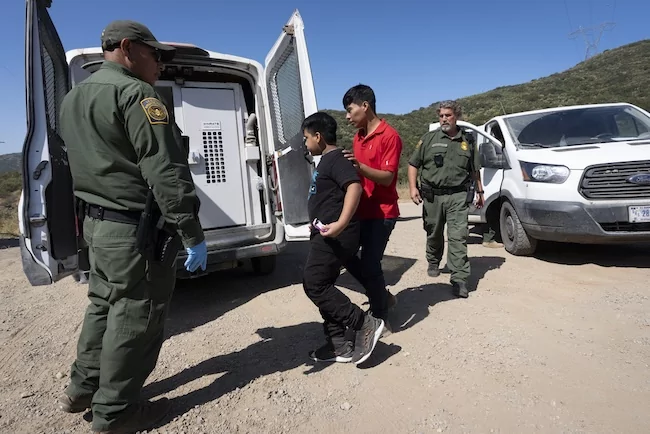The Supreme Court is set to hear a significant case that could reshape the ability of immigrants to appeal decisions made by immigration officials and become a boon for former President Donald Trump‘s agenda to deport illegal immigrants, should he win in November.
The nine justices will hear oral arguments on Tuesday in a case involving whether federal courts can review an immigration agency’s decision to revoke a visa petition. The final decision could have wide-reaching implications and make it more difficult for immigrants to contest decisions about their ability to remain in the United States as Trump campaigns for the presidency on a promise to initiate mass deportations if reelected.

“This is a technical dispute over whether courts can review the government’s decision to revoke an immigrant visa on the ground that it had initially misapplied nondiscretionary criteria,” Georgetown University law professor Steve Vladeck said in his Substack newsletter One First.
The case centers on Amina Bouarfa, a U.S. citizen, and her husband, Ala’a Hamayel, whose visa petition was revoked after immigration officials claimed he had entered into a fraudulent marriage with his ex-wife to gain legal residency.
Despite the ex-wife amending her initial statement, officials moved forward with the revocation, and Bouarfa’s appeals were denied. Lower courts, including the 11th Circuit Court of Appeals, ruled that the revocation decision was discretionary by immigration officials and therefore immune from judicial review.
If the Supreme Court upholds the lower courts’ decision, federal courts could have their hands tied from reviewing many similar cases, raising concerns among immigration advocates such as the American Civil Liberties Union.
The ACLU filed an amicus brief in the case, warning of “devastating consequences” for migrants and their families should the high court refuse to undo the revocation of Hamayel’s visa petition. It argued that blocking judicial review could prevent the courts from addressing even clear constitutional violations, such as decisions based on racial biases.
Bouarfa contended that appeals courts are divided on whether a visa petitioner can ask a federal court to review an agency’s decision to revoke a visa petition. “The initial decision to deny the petition would have been judicially reviewable,” the petitioner argued in her brief to the justices, according to a synopsis of the case from SCOTUSblog.
The case comes at a time when the immigration system is facing a massive backlog, with more than 3 million pending cases in immigration courts and first appearance dates that extend well into the future, up to 2027 in some instances. There have been around 10 million encounters with migrants at the border trying to enter the country since 2021.
CLICK HERE TO READ MORE FROM THE WASHINGTON EXAMINER
Advocates have voiced concerns that rushed or erroneous decisions by officials could go unchecked, leading to unjust outcomes for migrants seeking asylum or other forms of relief.
Justices are slated to weigh the case during oral arguments at 10 a.m. on Tuesday.























